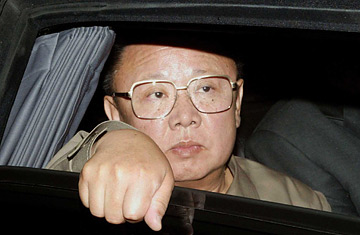
North Korean leader Kim Jong-il
The sticking point is one that has dogged relations between the two nations for the last several years: the fate of Japanese citizens who were abducted by North Korean agents in the 1970s and 1980s. Tokyo insists that there are at least four Japanese still unaccounted for in North Korea. Japanese Prime Minister Shinzo Abe — who built his career on his tough stance against Kim Jong Il — has repeatedly insisted that there can be no diplomatic normalization or aid provided as part of any nuclear deal with North Korea unless the abductions are resolved first. That means the safe return of any surviving abductees by Pyongyang or conclusive proof of their deaths. North Korea has admitted 13 kidnappings, but says that all abductees have been repatriated to Japan or have died, and considers the issue closed.
When Japan's chief negotiator told reporters before the talks that the return of the abductees was his "main objective," it was clear the meetings were unlikely to go anywhere. Normally the blame for failure would fall squarely on North Korea's negotiators, who never met a summit they couldn't stall. But this time Pyongyang may have a point. If North Korea really is telling the truth — admittedly, an unusual occurrence — and there are no surviving abductees, there may be little that Pyongyang can do to satisfy Tokyo's demands.
It's doubtful, however, that Japan would be ready to listen. The abductions were tragic — as anyone would know who has heard the elderly parents of abductee Megumi Yokota tell of their daughter, snatched near her home at the age of 13 by North Korean agents, never to be seen by her family again. But under Abe the quarter-century old kidnappings are increasingly taking precedence over the North Korean nuclear program on Japan's foreign policy agenda — and that is not healthy. His administration has connected Japan's tough sanctions against North Korean trade not to nuclear weapons, but to the kidnappings. Tsuyoshi Takagi, chairman of the Japanese Diet's special committee on abductions, recently told TIME that the kidnappings actually present a more significant danger to Japan than North Korean nuclear weapons because Pyongyang's missiles are merely a potential threat. The abductions, he says, were a "real physical attack" on Japan's sovereignty.
Given that Japan is more directly threatened by a nuclear North Korea than any other nation, that's not the wisest risk calculation, but it seems to be one that Abe is making. There are strong domestic reasons for focusing on the abductions — lingering public anger in Japan over the kidnappings represents a wellspring of support for Abe, whose approval ratings have nosedived over the last few months. But as Masao Okonogi, dean of Keio University School of Law in Tokyo, points out: "What's in the best interest of the current Japanese government may not necessarily be in the best interest of the Japanese people."
Abe also surrendered some of the moral high ground last week when he publicly expressed doubt that the Japanese military during World War II had coerced citizens of occupied countries into becoming "comfort women," a euphemism for sex slaves. Though Abe's aides scrambled to downplay his statement, he announced today that his government would assist a group of right-wing Japanese lawmakers in their efforts to reinvestigate the comfort women issue — which could be the first move in overturning a 1993 government apology on the subject. That Japan's Prime Minister is seen as calling on North Korea to come clean on the kidnapping of a handful of Japanese while casting doubt on his own country's responsibility for the trauma suffered by possibly hundreds of thousands of sex slaves — many of them Korean — doesn't exactly help his negotiation position.
Abe's refusal to compromise even slightly on the abductions means that Pyongyang and Tokyo will remain estranged — which puts Japan a bit out of step with a U.S. ally that's suddenly ready to engage with North Korea. Washington has repeatedly said that it respects Japan's position on the kidnappings, but if American and North Korean negotiators in New York remain on theatergoing terms, there's a risk that Japan might be left behind — and that would only make Kim Jong Il happy.
With reporting by Toko Sekiguchi/Tokyo
